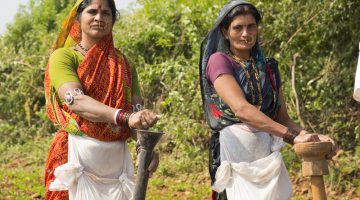Indian agriculture sector remains the backbone of the nation’s economy accounting for about 15% of the country’s Gross Domestic Product (GDP). As Indian agriculture is highly monsoon dependent, out of the 142 million hectares of net sown area, only 45% or 64 million hectares have access to irrigation facilities. Apart from high dependency on monsoon and irrigation facilities, the situation becomes critical when it is noted that about 15-25% potential crop production is lost due to pests, weeds and diseases. In order to meet the growing demand borne out of increasing population, the productivity of crops, efficient utilization of arable land, and effective usage of pesticides become essential factors.
With the monsoon going well in 2017-18, we may have a bumper production year on the heels of a good 2016-17. In 2016, India produced its largest ever cereal food grain estimated at 273 million tonnes. We also saw bumper production in pulses, sugarcane and cotton. Agricultural budgets have gone up from Rs. 16,646 crore to Rs. 41,855 crore in the last 3 years. The government has introduced many agro-centric initiatives like Pradhan Mantri Fasal Bima Yojana, Soil health cards, Pradhan Mantri Krishi Sinchayee Yojana and an electronic National Agriculture Market (eNAM). Minimum Support Price (MSP) for different crops have also been enhanced regularly. Our Prime Minister also pledged to work towards doubling farmers’ incomes by 2022.
Increasing demand of food grains and declining farmlands in India have increased pressure on farm yield improvement and reduction in crop losses due to pest attacks. Indian crop protection market was estimated at $ 3.8 billion in FY12 with exports constituting about 50% of the market. The crop protection market has experienced strong growth in the recent past and is expected to grow further, at approximate 12% p.a. to reach $ 6.8 billion by FY17-18. The growth would be largely driven by export demand which is expected to grow at 15-16% p.a, while domestic demand is
expected to grow at 8-9% p.a.
Despite being the second largest crop protection chemicals industry in Asia with a size of above Rs. 26,000 crore, use of these crop protection products has been limited by Indian farmers. Almost 50% of these products are exported and the crop losses due to non-usage of crop protection products were about 17.5 per cent of the yield amounting to Rs. 90,000 crore per annum. Consequently, lack of awareness regarding the use of crop protection products among Indian farmers have been a serious challenge for the industry. Government is making solid efforts to educate farmers about the importance of these products.
A long term strategic vision which puts in place a holistic framework is the need of the hour. Key areas that need to be addressed include ‘Increasing Supplier Power’, the ‘Producer – Consumer Linkages’ and ‘Customized Approach to Different Crop Groups’. These areas enabled with quality infrastructure, education, R&D, technology, marketing and risk mitigation will give us the agricultural empowerment we need.
The product stewardship engagement efforts of CropLife India have reached out to more than 10 Lakh farmers, under various awareness programmes on responsible use of crop protection products, container management, labeling practices; awareness amongst dealers and retailers on stocking genuine products and anti-counterfeiting measures. In order to enhance our outreach, CropLife will engage in a multiple stakeholder and layered outreach programme for the awareness of Personal Protection Equipments (PPE), across three States of India.
CropLife and its members, with their vast pool of experience, have been instrumental in anticipating future industry trends and have applied the insights to achieve sustainable growth apart from communicating the same to various stakeholders for achieving progressive regulations. While higher rate of GST on pesticides has fallen short of industry’s expectations, the sector has welcomed significant forward looking regulations that will ensure harmonization with OECD protocols in major disciplines. CropLife India and its members are fully supportive of the efforts of the Ministry of Agriculture for their flagship schemes of ‘Make In India’ and ‘Ease of Doing Business’ as these initiatives provide an impetus to India’s domestic efforts and strengthen our ability to compete globally.








